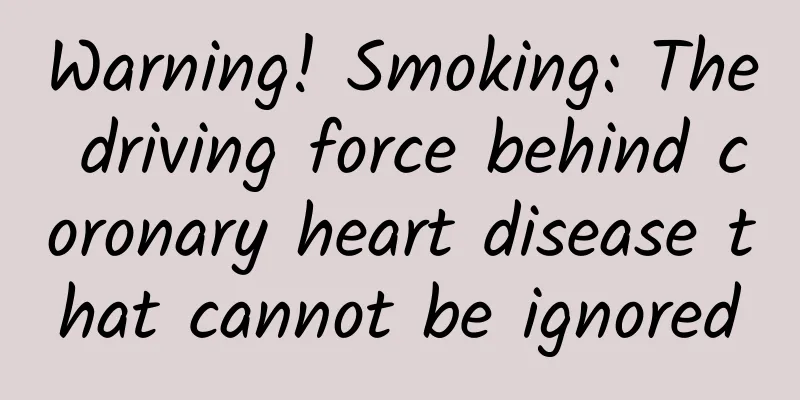Warning! Smoking: The driving force behind coronary heart disease that cannot be ignored

|
Author: Chu Yanyan, attending physician at Xuanwu Hospital, Capital Medical University Reviewer: Xia Jinggang, Chief Physician, Xuanwu Hospital, Capital Medical University As we all know, smoking seriously harms health. It is an important risk factor for multi-organ system diseases such as coronary heart disease, respiratory diseases, malignant tumors, diabetes, hypertension, and digestive system diseases. In 2018, the results of the National Adult Tobacco Epidemic Survey showed that the smoking rate of people aged ≥15 in my country was 26.6%, including 50.5% of adult males and 2.1% of females. Based on this calculation, there are 308 million smokers in my country aged ≥15. More than 1 million people lose their lives due to tobacco every year in my country. By 2030, the number of deaths due to tobacco in my country will increase to 2 million per year. It can be seen that strict tobacco control is imminent. Figure 1 Copyright image, no permission to reprint Smoking is an independent risk factor for coronary heart disease, which can significantly increase the incidence and mortality of coronary heart disease and can advance the onset of coronary heart disease by 10 years. Epidemiological surveys show that compared with non-smokers, the incidence of coronary heart disease is more than 26 times higher in heavy smokers, and the risk of myocardial infarction in smokers is 2.33 times that of non-smokers. The greater the amount of smoking and the longer the smoking period, the higher the risk of coronary heart disease. Smoking also significantly affects the long-term prognosis of patients with coronary heart disease. The incidence of cardiovascular events in smokers is significantly higher than that of non-smokers. Even for patients who take medication regularly, smoking can greatly reduce the effectiveness of medication. The risk of coronary heart disease decreases rapidly after stopping smoking. The risk can be reduced by 50% after quitting smoking for 1 year, and the risk of coronary heart disease is similar to that of normal non-smokers after 15 years. The risk of death from cardiovascular disease in smokers is significantly lower than that of current smokers, and the benefits become more obvious as the time of quitting smoking increases. Figure 2 Copyright image, no permission to reprint Tobacco smoke contains a variety of chemical substances, harmful substances and carcinogens, including nicotine, polycyclic aromatic hydrocarbons, tar and carbon monoxide, which can induce coronary artery disease in various ways. 1. Damage the function of vascular endothelial cells and accelerate the occurrence and development of arteriosclerosis. 2. It leads to an increase in leukocytes and intercellular adhesion molecules, triggering an inflammatory response while interacting with endothelial cells, further leading to endothelial dysfunction, increased blood viscosity and thrombosis. 3. It causes the body's inflammatory response and enhanced oxidative stress response, which can induce and aggravate cardiovascular diseases. 4. Nicotine can interfere with lipid metabolism. The levels of serum cholesterol, low-density lipoprotein cholesterol, triglycerides, etc. in smokers are significantly higher than those in non-smokers, while high-density lipoprotein cholesterol is significantly lower. 5. Nicotine can also increase the excitability of the sympathetic nerves, leading to increased blood pressure and heart rate in patients. The vasoconstrictor substances produced can cause spasms in small arteries and increase vascular resistance. Long-term smoking further aggravates hypertension. 6. Smoking affects the balance of the human body's coagulation and fibrinolytic systems, leading to increased platelet aggregation. 7. Smoking can work synergistically with other risk factors for cardiovascular disease, amplifying the effects of other risk factors. In daily life, although many people do not smoke, there is a smoking environment around them, that is, second-hand smoke. Second-hand smoke is also called passive smoking. According to statistics, the second-hand smoke exposure rate of non-smokers in my country is more than 68.1%. The harm of second-hand smoke is no less than that of first-hand smoke. Because the cardiovascular system is extremely sensitive to relatively low smoke exposure, even short-term exposure to second-hand smoke (from a few minutes to a few hours) may produce 80% to 90% of the active smoking effect on the pathogenesis of some cardiovascular diseases, including platelet activation and arterial constriction, making the risk of cardiovascular events in non-smokers close to that of active smokers. Studies have confirmed that during tobacco combustion, the release rate of many compounds in second-hand smoke is higher than that of first-hand smoke. For example, the carbon monoxide in second-hand smoke is 5 times that of first-hand smoke, tar and nicotine are 3 times that of first-hand smoke, ammonia is 46 times that of first-hand smoke, and nitrosamines, a strong carcinogen, are 50 times that of first-hand smoke. Second-hand smoke is also an important factor in the increasing incidence and younger age of coronary heart disease in women, adolescents, and adults. The harm caused by secondhand smoke is preventable, and the most effective way to protect people from exposure to secondhand smoke is to eliminate smoking. Figure 3 Copyright image, no permission to reprint my country has the largest number of smokers in the world. Millions of people die each year from smoking-related diseases. Smoking can increase the prevalence of coronary heart disease and the trend of younger people. Therefore, actively controlling smoking and avoiding secondhand smoke can effectively reduce the incidence of coronary heart disease. Therefore, we should say to every smoker around us: "For the health of you and your family, quit smoking completely, starting now!" |
<<: Revealing the secrets of aspirin: These key knowledge will help you use the medicine safely!
>>: Understand oral hypoglycemic drugs and deal with missed doses scientifically
Recommend
Liu Hao | Let there be no more difficult surgeries in the world
"Robots have largely liberated people's ...
What should I do if my pubic hair follicles are red and swollen?
Recently, many female friends have reported that ...
How to distinguish whether the coffee is freshly ground or instant? What is the difference between freshly ground coffee and instant coffee?
We all know that coffee is a common drink. It has...
What to eat if you want to have a boy
The phenomenon of favoring boys over girls has be...
Eezeer: Twitter usage among airlines in August 2011
In August 2011, Cebu Pacific became the second mo...
Is delayed menstruation and backache a sign of pregnancy?
When women reach a certain age, they will have th...
Why does a wool coat become hard? How to restore a wool coat that has become hard?
Wool coats are one of the must-have items in the ...
Is it normal for pregnant women to have yellow vaginal discharge?
Pregnancy is an important stage in a woman's ...
Can I have a painless abortion at 11 weeks of pregnancy?
Artificial abortion is a surgical treatment to he...
What are the causes of nosebleeds in pregnant women?
After a woman becomes pregnant, her body will sho...
How to treat women's sweating
For women, sweating seems to be a very common thi...
Ultrasound after abortion is normal but there is blood
Many women suffer from unwanted pregnancies due t...
Is beverage “grading” healthier?
□ Ruan Guangfeng In order to help consumers bette...
How to take care of uterine cysts?
It is understood that the incidence of uterine cy...
Why is sugarcane hollow? What kind of sugarcane tastes good?
Sugarcane is rich in nutrients and is a food rich...









